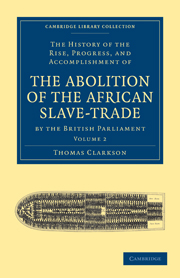Summary
Matters had now become serious. The gauntlet had been thrown down and accepted. The combatants had taken their stations, and the contest was to be renewed, which was to be decided soon on the great theatre of the nation. The committee by the very act of their institution had pronounced the Slave–trade to be criminal. They, on the other hand, who were concerned in it, had denied the charge. It became the one to prove, and the other to refute it, or to fall in the ensuing session.
The committee, in this perilous situation, were anxious to find out such other persons, as might become proper evidences before the privy council. They had hitherto sent there only nine or ten, and they had then only another, whom they could count upon for this purpose, in their view. The Proposal of sending persons to Africa, and the West Indies, who might come back and report what they had witnessed, had been already negatived. The question then was, what they were to do. Upon this they deliberated, and the result was an application to me to undertake a journey to different parts of the kingdom for this purpose.
When this determination was made I was at Teston, writing a long letter to the privy council on the ill usage and mortality of the seamen employed in the Slave-trade, which it had been previously agreed should be received as evidence there.
- Type
- Chapter
- Information
- The History of the Rise, Progress, and Accomplishment of the Abolition of the African Slave-Trade by the British Parliament , pp. 1 - 117Publisher: Cambridge University PressPrint publication year: 2010First published in: 1808

